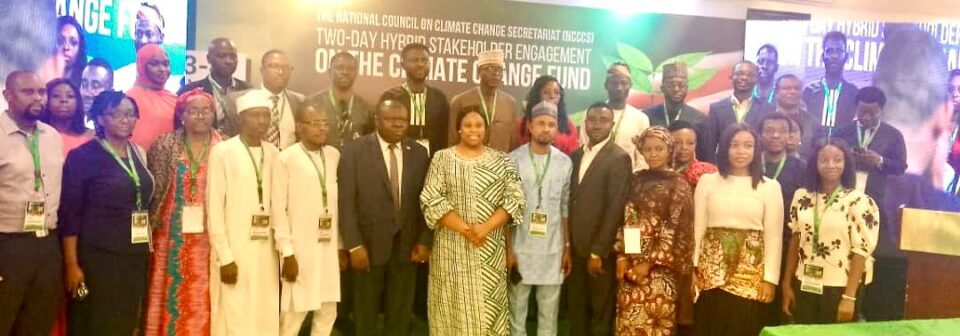By Chuks Oyema-Aziken
The National Council on Climate Change Secretariat, NCCCS, has begun moves with stakeholders to operationalise Nigeria’s Climate Change Fund to enable her attract global climate financing and support the country’s net-zero ambitions.
The Director-General, NCCCS and Special Presidential Envoy on Climate Change, Dr Nkiruka Maduekwe disclosed this during a two day “Hybrid Stakeholder’s Engagement on Climate Change Fund” in Abuja.
She stressed the urgency of establishing the fund, which remains inactive despite being mandated by the 2021 Climate Change Act.
Maduekwe highlighted that the fund would position Nigeria to attract financing from international sources such as the Green Climate Fund (GCF), Global Environment Facility (GEF), and Adaptation Fund, among others.
The DG said the collaboration with stakeholders will drive Nigeria’s transition to a low-carbon, climate-resilient economy, securing a sustainable future for all.
Dr Maduekwe, stressed the urgency of establishing the Climate Change fund, which remains inactive despite being mandated by the 2021 Climate Change Act.
“The Climate Change Fund is very important, And so for us as the Secretariat, this is a long time coming. The Secretariat was established by the 2021 Climate Change Act and the Council was inaugurated in 2022.
“But from 2022 to date, one of the key things is operationalizing the Climate Change Fund and that hasn’t happened yet. And so for us, it is important, it is urgent that the Climate Change Fund is operationalised.
“But how do you operationalise something with nothing? And so this stakeholder engagement is very key to taking the feedback, co-creating the pathway for the Climate Change Fund and understanding that this is the path that Nigeria wants to take with regards to the architecture of the fund, the different windows, with satellite innovation, adaptation, operations.”
She explained that the Climate Change funds would be used for investment in green projects and initiatives, Research and development of innovative approaches in climate action
Awareness creation on climate change Capacity building of youths on green skills, energy transition initiatives and strengthening institutions.
Nigeria Project Coordinator, Green Protocol, Deborah Anumenechi, said that the establishment of the National climate change fund is not just a policy objective, but a crucial steps for Nigeria’s climate ambitions.
She urged stakeholders to work together to ensure the climate change fund is transparent.
“By working together, we can ensure that the climate change fund is transparent, impactful and aligned with Nigeria’s broader climate and economic goals.”
Rwanda High Commissioner to Nigeria, Christophe Bazivamo explained that climate crisis is not just a national challenge, but a continental and global emergency and Africa despite contributing the least to global emissions, suffers most from Desertification in the Sahel to rising sea levels along the Atlantic coast.
“From biodiversity losses to extreme weather level we see first hand how poorest and most vulnerable communities pay for highest price for crisis they did not create, in fact in many areas in Africa, we witness droughts, witness floodings, we witness very negative impact with loss of infrastructure.”



